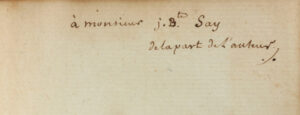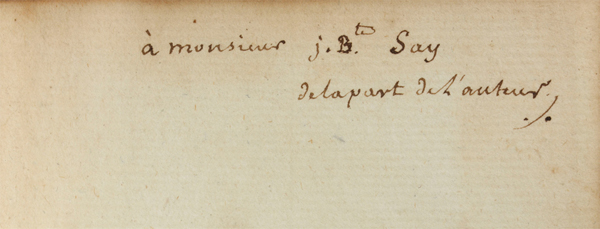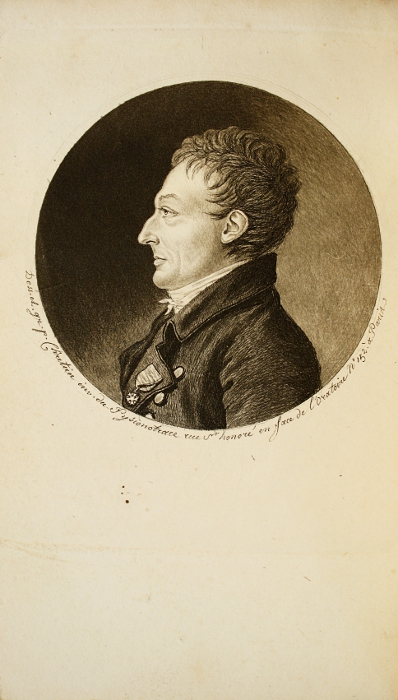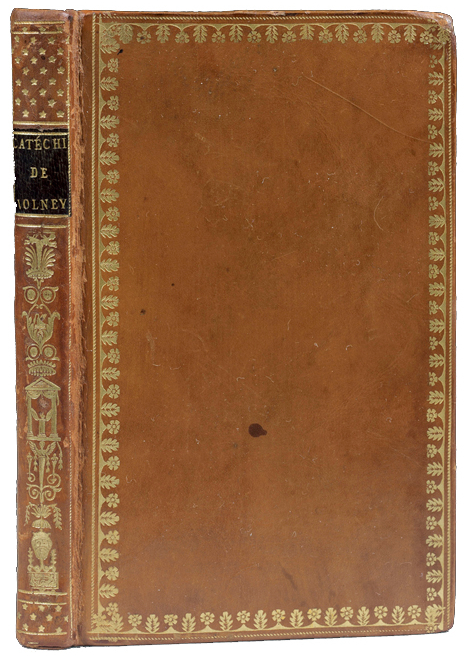VOLNEY, Constantin François Chasseboeuf, comte de. La Loi naturelle ou catéchisme du citoyen français. Paris, Courcier, 1809.
Small 12mo [130 x 80 mm] of: 1 portrait in frontispiece, (2) ll., viii pp., 144 pp., owner’s stamp on the title and on pp. 77 and 144. Manuscript correction on p. vii of the preface. Bound in contemporary light brown glazed calf, gilt border on covers, flat spine finely decorated with a semis of gilt stars and special tools, black morocco lettering-piece, gilt edges. Contemporary binding.
Edition illustrated with a beautiful portrait of the author of this treatise of moral by Volney.
The present treatise was first published in Paris in 1793 in the 16mo size. It achieved great success and was reprinted several times.
“In the present treatise Volney deals with each order of virtues and therefore vices. He counts five main virtues: science which comprises prudence and wisdom; temperance, which contains moderation and chastity; courage, or the strength of the soul and the body; activity that is to say love of work and the use of time, and finally cleanness, or pureness of the body, both in clothing and in the house…
After individual virtues come domestic virtues. These are actions that are useful for the family, and therefore for oneself too. We count six of them: economy, paternal love, conjugal love, filial love, fraternal love and the accomplishment of the duties of masters and servants.” (Damiron, Mémoires pour servir à l’histoire de la philosophie du XVIIIe siècle, pp. 241-243)
« Volney published in 1793 ‘La Loi naturelle ou Catéchisme du citoyen français’, one of the best moral treatises that has ever been published in any language. The ideas are condensed; the style is firm and concise: we note this severe choice and this particularity of expression that the philosophers of Pascal and of Condillac’s school have set the example. In the collection of Volney’s works, the second title of this important work, despite its little expanse, gave its place to this one: ‘Principes physiques de la morale’. Indeed, the author knew how to demonstrate that moral is a physical and material science, so to speak, submitted to the rules and calculations of exact sciences; and it has no other goal but the preservation and the improvement of human race. A biographer said that it was in order to prove that he was not a heretic, that Volney on his return from Corsica published this little work. It is fairer to observe that this production does not establish anything pro or cons Volney’s catholicity; but at least it proves that he was not atheist: since the first character he recognizes to the natural law is to be ‘the constant and regular order by which God governs the universe ». (Biographie universelle, 49, p. 443)
“Only few books have been as much praised or criticized. Before Saint-Lambert and under a more concise form, Volney realized a work drafted by Voltaire and d’Alembert, Helvetius and d’Holbach.” (F. Picavet, Les idéologues, p. 134)
The present edition is illustrated with a beautiful portrait of Volney engraved by Chrétien.
A precious copy offered by the author to the French economist Jean-Baptiste Say with this autograph dedication by Volney on the first white endpaper: « A monsieur J. B. Say de la part de l’auteur ».
A fine copy preserved in its contemporary light-brown glazed calf binding with a finely decorated spine.
OCLC doesn’t record any copy of this edition.
See less information




